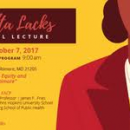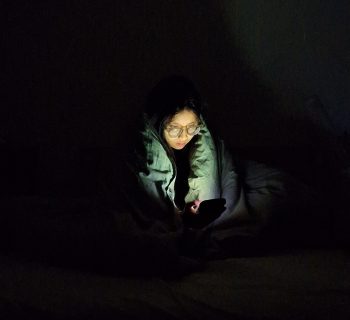Meg Masseron
*Articles reflect the views of the author and or those quoted and do not necessarily represent the views of CCBC or the CCBC Connection.
It’s completely evident that teenagers are well aware of - if not completely immersed in - the wonders of dieting and weight loss. However, the dangerous results of this culture are blatantly obvious when you sit around the average, healthy teenager, and hear them say they’re “so fat,” even when wearing size four jeans.
Magazines, television programs, websites - they all encourage dieting and weight loss. Diet culture is pretty much everywhere we look in the media, so it’s no wonder teenagers are so heavily influenced by it. Many doctors and parents may claim that dieting amongst teenagers is good, that it will help their health and prevent obesity.
Dieting and weight loss does not serve the purpose of preventing obesity. Eating healthy - normally, and not overeating will prevent obesity. Weight loss doesn’t prevent obesity, it’s a solution to obesity. So when normal, average-sized - if not “skinny” - teenagers are surviving off of half an avocado and three bottles of fancy fruit water a day, why is it condoned and encouraged, even by some professionals?
There’s nothing wrong with a healthy diet. There’s nothing wrong with making sure you’re putting good things into your body, and there’s nothing wrong with losing a few pounds if you want to. However, it’s important to acknowledge no one should feel like they need to. The lines between wanting to lose weight and feeling a need to lose weight are blurred, and it’s hard to not feel obligated to look like the Victoria’s Secret model that was on your TV last night when the media is screaming at you to lose weight. There’s a certain unspoken obligation felt amongst women today that if we are eating in public, we should be eating a salad. There’s a common theme of women going out to lunch with their friends, all claiming they’re “fat” for ordering pasta, as if one meal dictates who they are. One bowl of pasta.
I’m nineteen years old, and I notice the stigma, shame and pressure to be thin more and more everyday in my friends and peers. It’s especially clear to me of all people, though, considering the fact that the high emphasis on diet culture is basically what led me to my death bed when I was about thirteen.
Cue the flashback to a young, highly impressionable just-turned-teenage girl, who throughout her life has seen her 40-year old cousin drown herself in water bottles a day to “speed her metabolism,” and her grandmother point at her plate at Applebee’s and explain how “fattening” it is while pinching her waist and saying “pinch an inch, and you’re too fat.” As a kid, although I was uncomfortable with my (minimal) baby fat, I always thought that maybe it was just my relatives that were obsessed with the topic of weight. When I got older, though, and read all the magazines and watched a million talk-shows, I started to see dieting was everywhere.
By September 2011, I finally went on a diet. I took some less-than-reputable information from a weight loss blog and went right into it. It started as a sort of Special K diet, like eating cereal and granola bars for most of the day, and by Christmas ended with a size zero thirteen year old that had lost forty pounds in three months and ate nothing but bread, soup and vegetables...if that.
I didn’t know what anorexia was. I didn’t know anything was wrong, especially since so many self-proclaimed dieting experts got away with eating only fruit and rice and seemed just fine. Yet, when my mom tried to give me a Lean Cuisine for dinner, I found myself curled up in a ball, crying in fear. It was only then any of my family realized something was wrong. Everything was fine before that, I was just the next member of my family to go on a “strict diet.”
I’m the golden example of diet culture gone wrong. I’m the epitome of why teenagers shouldn’t feel so pressured. I didn’t even think I was hurting my body, I didn’t even notice my hair falling out or my skin becoming so rough and coarse that my knuckles bled because when I looked in the mirror, all I saw was my waist, my arms, my legs. In a world of juice cleanses and smoothie fasts, I was completely and utterly convinced I was on a safe diet. One could argue that anyone with common sense could see how illogical it is to think your body can survive on less than a quarter of the calories it needs in a day, but I was just a kid. Teenagers are kids. They’ll believe anything if it will get them what they want, and in my case, what I wanted was to be thin. Teenagers should not have weight loss beat into their head, yet, every issue of Seventeen and Teen Vogue I’ve had sent to my house over the past six years has featured headlines such as “how to shed ten pounds before homecoming” on their cover.
I’ve been recovered for six years now, but it’s hard to distinguish between the voices in my head and what’s displayed in the media because they both sound so similar, and it’s even more difficult to find a way to ignore them both. Throughout the years I’ve frequently made others aware that I’d struggled from an eating disorder, feeling like I had to have some sort of excuse for being overweight. Some sort of apology, like “hey, I know I’m disgusting, but I promise I was good enough once.” I felt like that was the sticker I had to slap on my forehead, the preface for every meal I ate in the cafeteria that wasn’t a salad. Apart from the occasional chicken tenders, I actually eat fairly healthily, but for a young girl, it always seems like “healthy” is living on salad.
As uncomfortable as it can sometimes be for me, I’ll eat my chicken tenders and ignore the stares around me that seem to scream that I don’t deserve to put that kind of food in my mouth. I’m proud of my body because it’s a symbol of rebellion. It’s saying that I am comfortable when my entire life society has made me feel that I shouldn’t be.
*Articles reflect the views of the author and or those quoted and do not necessarily represent the views of CCBC or the CCBC Connection.















This article made some great points! I do believe the lines are blurred today between wanting to lose weight and feeling the need to lose weight. People should feel motivated to lose weight for the right reasons. Weight loss is a personal goal meaning you are doing it for your own reasons and should not care about what anyone else thinks.
Your article made excellent points. Dieting and losing weight are around us everywhere we look. From magazines to ads it is telling younger people that it is not ok to have rolls. There is a difference from losing weight and being healthy. If you ask my friends they find someone more attractive if they have a little meat on their bones and aren’t as skinny as a rail. You should want to lose weight for the right reasons and not just to fit in with everyone else.
I would like to give you huge thumbs up for the information you have shared in this post.
Thanks a lot for being my coach on this issue. I actually enjoyed your
own article a lot and most of all favored how you really handled the areas I regarded as being controversial.
You’re always very kind towards readers like me and let me in my
existence. Thank you.